Joke's On You: 2010's Tech April Fools Pranks

Got Ya!
Even the stuffiest of the stuffy can take a joke on April 1. It's the one day a year when all bets are off and, if you're not paying attention or are just that gullible, someone may pull a fast one on you. Nowhere are these gags more prevalent than on the Web and the high-tech industry is chock full of devious brains just looking to pull the wool over our unsuspecting eyes.
This year was no exception, as a host of high-tech companies pulled out all the stops to fool a few and draw their fair share of chuckles. Here we collect 12 April Fool's Day pranks that had us howling (and a bonus look at one company that takes April Fool's Day way too seriously).

We're Not In Kansas Anymore
When it comes to techy April Fools pranks, Google wears the crown (as you'll see a few more times). But none were better than Google convincing the globe that it was changing it's now-iconic moniker to "Topeka" after the city in Kansas. Google's name change was in response to Topeka, Kansas' mayor announcing last month that the city would now be known as Google.
Google, er, Topeka, said the decision wasn't an easy one to make and advised users that from now on, all product names must take on the new handle as well. So get used to using Topeka Maps, Topeka Talk and Topeka News, not to mention that new Topeka Android phone.
Well, time to go Topeka that movie about the wizard in that land called Oz. Any idea what that was called? Hopefully a quick Topeka search will help.
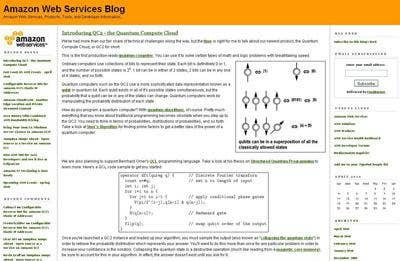
Finally, Speedy Math In The Cloud
Amazon Web Services (AWS) used April Fool's Day to take a well-needed jab at the hype surrounding cloud computing, announcing the launch of its Quantum Compute Cloud, or QC2. QC2 is billed as the first production-ready quantum computer that can be used to solve certain math and logic problems at "breathtaking speed."
Using a complex set of algorithms and representing data in qubits, Amazon promises the only quantum computer of its kind, in the cloud, no less.
"Until now, the largest quantum computer contained less than 8 qubits. Because we're really, really smart, we've been able to push this all the way to 32 in the first-generation QC2. This will allow you to represent problems with up to 232 distinct states," Amazon wrote.
Too bad for those stoked on QC2 that the beta is extremely limited and Amazon plans to close it by the end of today. Guess we'll have to wait for the QC2's re-launch to use the "amazing spooky action at a distance property of quantum entanglement." Dangit!
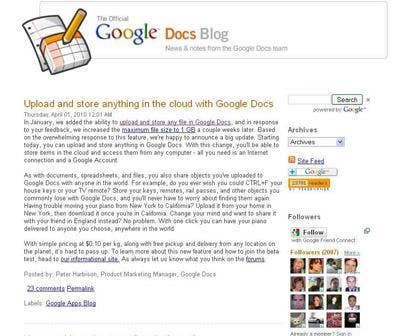
Have You Seen My Keys? My Glasses?
Having trouble finding your keys? Have you checked in the cloud? No?
Back in January, Google added the ability for Google Apps and Google Docs users to upload and store any type of file in the cloud-based application. Now, Google is welcoming any type of items into the cloud. Essentially, users with a Web connection and a Google account can upload and store anything in the cloud.
"As with documents, spreadsheets, and files, you also share objects you've uploaded to Google Docs with anyone in the world," Google said. "For example, do you ever wish you could CTRL+F your house keys or your TV remote? Store your keys, remotes, rail passes, and other objects you commonly lose with Google Docs, and you'll never have to worry about finding them again."
Using Google Docs, users can now move a piano from New York to California in the cloud. With one click it can go anywhere. And Google is keeping the price low, charging just $0.10 per kg along with free pickup and delivery.
Hopefully Google Docs users realize this is an April Fools gag before that piano is on its way across the country.
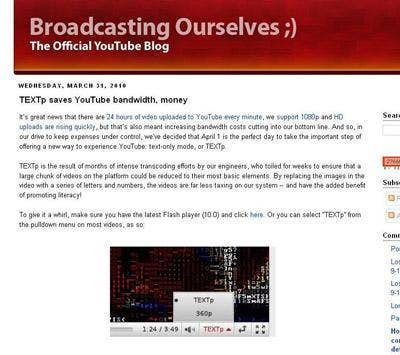
Playing The Numbers Game
YouTube knows it's a bandwidth hog. With more than 24 hours of video added to the site each minute, HD support and all that other bric-a-brac, YouTube needs to cut some costs. So, to chop the bottom line, YouTube on Thursday unveiled the new TEXTp mode.
"TEXTp is the result of months of intense transcoding efforts by our engineers, who toiled for weeks to ensure that a large chunk of videos on the platform could be reduced to their most basic elements. By replacing the images in the video with a series of letters and numbers, the videos are far less taxing on our system -- and have the added benefit of promoting literacy!" YouTube wrote.
YouTube said that for each person who selects TEXTp and keeps it on while watching a video; YouTube can save billions " $1 per second to be exact.
YouTube, you had us at promoting literacy!

This Message Will Self-Destruct In...
Leave it to Lexmark to channel the James Bond in all of us. With a series of strategically placed Tweets and news stories the printing giant convinced a good chunk of its U.K. audience that it had developed a new invisible printing ink to keep sensitive communications confidential. Available for all printer models and in a variety of colors, Lexmark aimed the invisible ink at police, military and other organizations that need to keep printed materials under wraps.
"So many incidences materialize whereby paper-based information falls into the wrong hands," said Darren Mangan, marketing director for U.K. and Ireland at Lexmark, in a statement. "Working closely with high-level forensic teams we have mastered the perfect blend of high quality ink, coupled with a secret ingredient that, to the naked eye, is invisible when printed onto the page. We see not only police forces taking this up, but also those home-users out there who want to keep confidential information for their eyes only."
A link to a demonstration leads users to the Web page seen here.

To Infinity And Beyond!
Web browser Opera launched a new edition of its popular browser that lets users surf the Web from space. Opera Space Edition was launched into beta on Thursday and, according to Opera, supports Interplanetary Network Transport Protocol (INTP) which allows Web connections from great distances and enables users to surf from the "vacuum of space."
Other features include Mission Mode, which lets Mission Control view, audit and monitor Opera Space Edition use; Augmented Reality Browsing (ARB), a tool that renders Web content in a transparent overlay mode to work with the Visual Retinal Displays in space suits. Opera Space Edition also features touch-screen optimization for space gloves.
Next time you're on Mars, check it out.
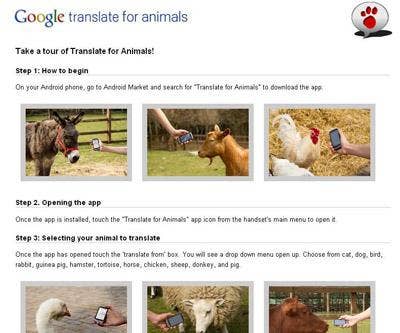
What's That, Boy? Timmy's Stuck In The Old Well?
Google was at it again, this time unveiling an actual application for Google Android that it says can translate what animals say.
Google Translate for Animals is an Android app that Google says "will allow us to better understand our animal friends." The application -- which is really available in the Android Market -- lets users select the animal type and the language to translate to. From there, it records the animal and the app recognizes and transcribes the words and phrases that are common to the species.
Google even launched a video demonstrating how to use Translate for Animals.
Now you can know what your dog is really saying when you put that silly t-shirt on him.
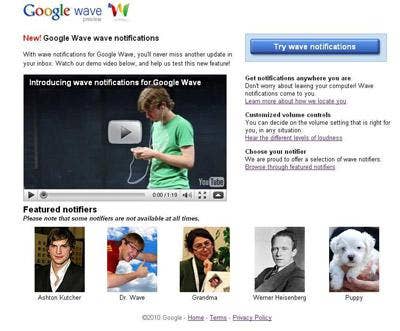
Riding The Wave
Google doesn't want anyone to miss their Google Wave notifications. That's why on Thursday Google launched a new set of notifications that sends actual humans to notify users of when Google Wave has been updated.
These real humans, including Ashton Kutcher and the superhero known as Dr. Wave will find you and wave at you when Wave has been refreshed.
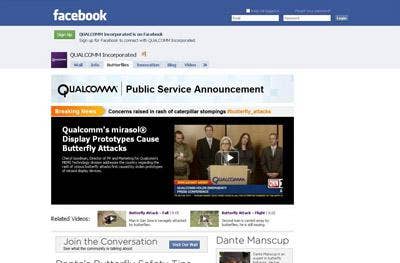
Watch Out For Butterfly Attacks
Qualcomm, the chip and device maker, got in on the action launching a series of special reports about people being attacked by butterflies, even launching a video detailing the attacks and holding a mock press conference.
Turns out stolen prototypes of Qualcomm's Marisol display devices are mimicking the way butterfly wings reflect light and the vivid displays are launching butterflies into a vicious attacking frenzy.
Good thing Qualcomm's Marisol prototype doesn't attract bears.
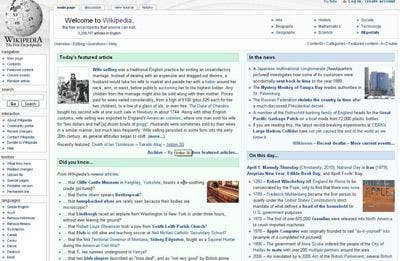
Take My Wife, Please!
Wikipedia is in the spirit, or at least we hope.
The main news item on the English page of the online, user-edited encyclopedia is a chronicle of the old practice of wife selling as a way to end an "unsatisfactory marriage."
Other fun items from Wikipedia include a piece on a Japanese multinational conglomerate that sent some customers back in time to 1999.

Finally! A Forecast We Can Rely On
Austin-based atsec information security knows that cloud computing has become overhyped. But why not capitalize on it, right? The company on Thursday launched a new service to make the cloud more predictable with its "cloud computing weather forecast service." The service offers a meteorological view to cloud commuting, as the cloud and the weather are similar systems.
"What may sound like a strange idea for some has a very realistic background: like many activities that require 'good' weather to be performed, customers of cloud computing services may require a 'secure' state of the cloud to have their business critical data being stored and processed in the cloud," said atsec chief meteorological officer Helmut Kurth. "Like the regular weather, also the security state of the cloud (meaning the IT-systems and networks that are used to build the cloud) may change dramatically over time. Regular security audits (for example those based on ISO/IEC 27001) will only provide the view of the time the audit was performed (which is usually done in 'good weather conditions' only). Therefore such audits are not very helpful to determine the current security state and are even less helpful to predict the future of the security state of the cloud."
To predict patterns in the cloud, atsec uses its advanced knowledge, a high-resolution radiometer and a scrying ball made from recycled silicon chips. From there, the results are presented in ways users can understand, as weather symbols. For example, sunshine means the cloud is fine and there are no major problems; partly cloudy means there may be some less critical security problems in the cloud; hail warns of caution, as cloud issues are anticipated that could damage data; lightning means the cloud is under attack; and night time illustrates that the cloud is down and not operational.
The forecasting tools are accurate and correctly predict cloud weather patterns 99.8 percent of the time, atsec said. If only real meteorologists could predict patterns with such accuracy.

Every Party Has a Debbie Downer
Leave it to Microsoft to dampen everyone else's good time on April Fool's Day. Instead of taking the opportunity to play a gag, Microsoft reminded us all of the dangers of having fun.
The software giant used April 1 to kill the buzz with a news release highlighting the five myths of software piracy.
While Microsoft's message is an important one and software piracy is a serious crime, Microsoft could've had a little more fun with it and gotten to the serious stuff later on.
April Fools?